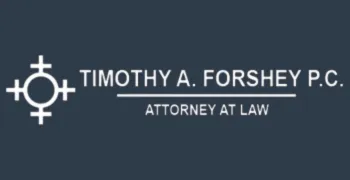CRIMINAL LAW
Choosing our Firm to defend you will result in our bringing to bear a wealth of experience, dedication, and a deep understanding of the legal system to your case. With a proven history of successfully defending clients against a wide range of criminal charges, we offer personalized attention, ensuring that your unique situation is fully understood by the State and that you are effectively represented. Our team is committed to protecting your rights, crafting a strategic defense, and fighting tirelessly to achieve the best possible outcome. When facing criminal charges, having us by your side means having powerful advocates who will stand with you every step of the way, up to and including trial, or even an appeal, if needed.
Tim Forshey has almost 40 years of experience in the Criminal Law Arena. Our firm handles the full gamut of criminal cases, from misdemeanors like criminal traffic offenses (including all manner of Driving Under the Influence cases) all the way up to serious felonies which threaten you and your family’s freedom. We understand that this is likely the most traumatic event that has ever faced you and your family, and we treat that situation with the appropriate level of gravitas. We can and do work hand in hand with counselors and other licensed medical professionals to help you and yours cope with this prolonged battle from a place of acceptance and determination rather than helplessness. Along with a firm grasp of the law, we will also bring intelligence, logic and science to bear on your legal fight in order to provide the maximum protection of your rights. We will build and present your strongest defense, and we will continue to advocate for you throughout the legal process. Maximum effort will be made, especially in cases involving self-defense, to avoid the filing of formal charges in the first place, preventing the commencement of a nightmare.

Frequently Asked Criminal Law Questions
What Is the Distinction between Types of Crimes, Felony, Misdemeanor, Infractions?
A felony is a serious criminal offense, such as murder or grand theft, and carries a potential sentence of from 4 months to life in the Department of Corrections (prison). Felonies in Arizona range from Class 6 (the least serious) up to Class 1 (the most serious). A misdemeanor is a less serious criminal offense, such as disorderly conduct or Driving Under the Influence (which CAN be a felony) and carries a potential sentence of six months or less in a municipal or county jail, probation and fines of up to $2,500.00. Misdemeanors in Arizona range from Class 3 (the least serious) up to Class 1 (the most serious). A civil violation (in other states often known as an infraction) is a non-criminal violation of a law or ordinance, such as a traffic violation, and carries a fine or administrative penalty but no possibility of jail time. One is not found “guilty” of a civil violation—one is found “responsible” or “not responsible.” The most serious consequence of being found responsible is usually an increase of your auto insurance rates.
What should I do if I am arrested or charged with a
crime?
If you are arrested or charged with a crime, it's important to stay calm and exercise your rights. Perhaps most importantly at this point, your fifth amendment right to remain silent; do not discuss your case with anyone except your attorney. Politely request to speak to a lawyer and do not answer any other questions, as anything you say can be used against you. Do NOT resist arrest, as this can lead to additional charges, and you will only succeed in becoming very tired and bloody prior to being handcuffed anyway. Ensure you contact a criminal defense attorney as soon as possible to help you navigate the legal process and protect your rights. Finally, be sure to follow any/all instructions from your attorney and the court closely.
Can a defense attorney help with clearing my
criminal record?
In Arizona, in most instances, yes, a criminal defense attorney can help you navigate the process of clearing your criminal record in Arizona, including having your conviction(s) set aside, sealing your record, and having your civil rights (such as the right to vote, keep and bear arms, etc.) restored. An experienced attorney can help you understand the laws and procedures, determine your eligibility, and prepare the required paperwork. As with most legal matters, it usually proves to be more difficult for people convicted of crimes to succeed here when representing themselves.
Will the Government Really Give You a Lawyer?
The government’s duty to provide a lawyer for a criminal defendant is established by the Sixth Amendment of the U.S. Constitution, which guarantees the right to counsel. This means that if a person cannot afford a lawyer, the government must appoint one for them. This is known as a court-appointed lawyer or public defender. It bears saying, however, that not just anyone who claims they “cannot afford an attorney” receives a court-appointed public defender. The Judge assigned to your case must investigate your circumstances and make a finding that you are unable to afford an attorney—a legal concept usually referred to as “indigency.” Simply put, if you are reading this on your own computer, do not count on receiving a court-appointed lawyer!
What qualifications and experience do your defense
attorneys have?
A competent Criminal Defense attorney must be a member in good standing of the state bar and be intimately familiar with and have experience practicing in the area of criminal law. Though not required, some states, including Arizona, allow attorneys to pursue a certification of “specialization” in criminal (and several other types of) law. In order for an attorney to seek “specialization” status, they must avow to the State Bar that at least 51% of their practice consists of that type of case. For general practitioners who actively practice in multiple disciplines, such as our law firm, such specialization status is, of course, thereby mathematically impossible.
How much does hiring a defense attorney
cost?
Often the most pressing and relevant question a potential client can have, this is also, unfortunately, often the most difficult question to answer without an intimate knowledge of the particular case/charges being faced. The cost of a criminal defense lawyer can vary widely depending on several factors, including the type of charges, whether the client is incarcerated, the lawyer's experience, and the location of the court. For this reason, we highly recommend some type of Pre-Paid Attorneys Fee Program such as Guardian Legal Protection Services.
What should I expect during the legal
process?
During the criminal legal process, you can expect to undergo one or all of several key stages. First, there will be an investigation where law enforcement gathers evidence and may arrest the suspect (you or yours). Next, within 24 hours (by law in Arizona) an arraignment occurs where the charges are formally presented, the defendant enters a plea, and the terms and conditions of release (including bond) are determined by the Court. If the case proceeds, there may be expert (polygraphers, private investigators, forensic scientists, ballisticians, etc.) investigations, pre-trial motions and extensive discovery, where both sides exchange evidence. It is often at this phase where plea negotiations may yield the most pickable fruit available to a Defendant. The trial phase follows, where the prosecution and defense present their cases to a judge or jury. Finally, if found guilty, sentencing will take place, where the judge determines the appropriate punishment in accordance with statutory requirements (Arizona has mandatory sentencing ranges based upon severity and nature of the crime and the Defendant’s prior criminal history. If convicted, a series of appeals can follow.
Do I Need to Hire a Criminal Lawyer?
It depends. If there is even a potential (even if small) chance of a conviction for a crime, such as any felony, or a domestic violence misdemeanor (which causes a loss of certain civil rights), it may likely prove to be the costliest mistake you ever make to not spend the money to hire a competent attorney to assist you. The old saying “penny wise and pound foolish” comes to mind. If you later decide “in hindsight, I wish I had hired an attorney,” it will be too late. It is especially wise to err on the side of caution when your freedom is in jeopardy. A criminal defense lawyer can represent your best interests in court and help negotiate the best outcome possible.

